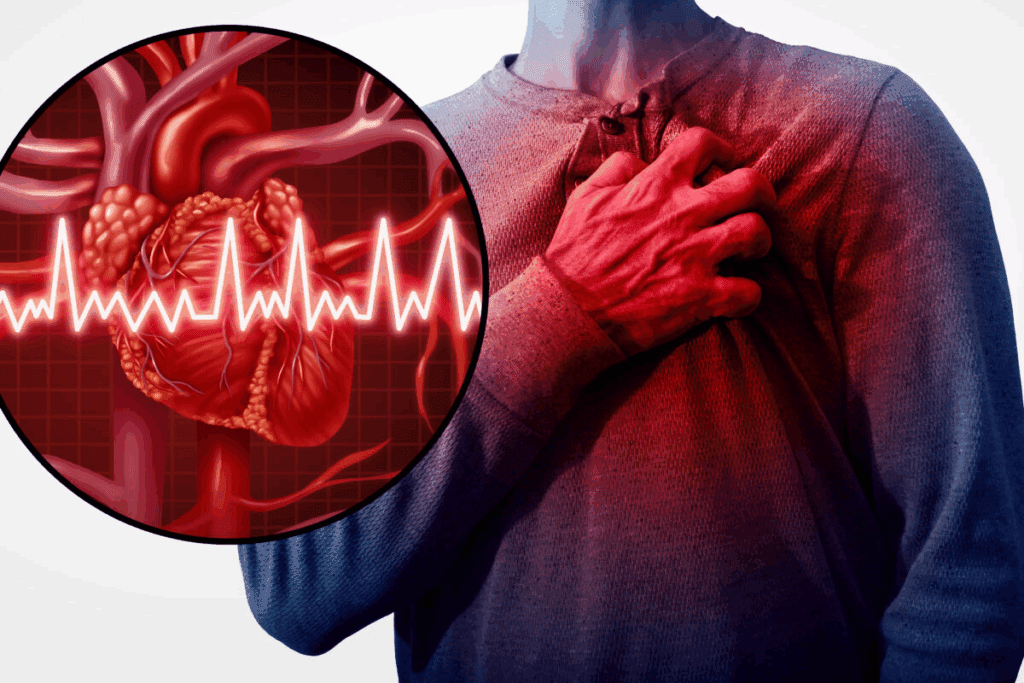Last Updated on November 25, 2025 by Ugurkan Demir

Chronic stress is a big problem for heart health. It can lead to high blood pressure and heart attacks. The American Heart Association says stress is twice as likely to cause high blood pressure. This is a major risk for heart attack.
Life today can be very stressful. This stress affects our heart health a lot. The link between stress and heart disease is complex. Stress hormones like cortisol and adrenaline can harm the heart a lot.

It’s key to know how stress impacts the heart for good heart health. Stress sets off a chain of body responses that can harm the heart now and later.
Stress makes our body release hormones like cortisol and adrenaline. This starts the “fight or flight” response. It’s meant to be short-lived, but constant stress keeps these hormones active.
Key Effects of Stress Hormones:
Stress hormones raise heart rate and blood pressure, putting strain on the heart. Long-term exposure can cause heart disease.
| Physiological Change | Immediate Effect | Long-term Consequence |
| Increased Heart Rate | Enhanced cardiac output | Cardiac fatigue |
| Elevated Blood Pressure | Temporary vascular strain | Hypertension, vascular damage |
| Vascular Reactivity | Redirected blood flow | Atherosclerosis risk |
Knowing these effects helps us see why managing stress is vital for heart health.

Research has shown a strong link between stress and heart attacks. Both sudden and ongoing stress can cause chest pain and irregular heartbeats. It’s vital to grasp how stress can harm the heart.
Studies have linked stress to a higher risk of heart disease. Chronic stress is a big risk factor for heart problems. It can raise blood pressure and heart rate.
A study in the Journal of the American College of Cardiology found that work stress increases heart disease risk. This includes the chance of heart attacks.
“The relationship between stress and cardiovascular disease is complex and multifaceted, involving both direct physiological effects and indirect influences on health behaviors.”
People under stress often make unhealthy choices like smoking and poor eating. Stress, behavior, and heart health are closely linked. This makes managing stress key to heart health.
Stress triggers our body’s “fight or flight” response. This releases hormones like cortisol and adrenaline. These hormones increase heart rate and blood pressure to prepare for stress.
But, long-term stress can harm the heart. It can cause inflammation in arteries and lead to irregular heartbeats. Stress can also lead to unhealthy habits, like overeating or substance abuse, which worsen heart health.
Understanding the link between stress and heart attacks is key. It shows why managing stress is essential for heart health.
It’s important to know the difference between acute and chronic stress to understand how it affects your heart. Stress can come in many forms, each affecting the heart in its own way.
Acute stress causes your heart rate and blood pressure to go up right away. These changes usually go back to normal once the stress is gone. But sometimes, acute stress can cause serious heart problems.
When you’re under acute stress, your body goes into “fight or flight” mode. This releases stress hormones like adrenaline. Your heart beats faster and pumps more blood, getting ready to face the danger.
Chronic stress, though, slowly damages your heart. Stress hormones over time can cause inflammation in your arteries and raise your blood pressure. This increases your risk of heart disease.
Long-term stress can lead to serious heart issues. It can cause atherosclerosis and raise your chance of having a heart attack.
| Stress Type | Immediate Effects | Long-term Consequences |
| Acute Stress | Elevated heart rate, increased blood pressure | Potential for cardiovascular events, arrhythmias |
| Chronic Stress | Prolonged exposure to stress hormones | Inflammation, atherosclerosis, heart disease |
Knowing the signs of heart stress is key to acting fast. These signs include chest pain, shortness of breath, feeling tired, and irregular heartbeats. By understanding the effects of acute and chronic stress, we can take steps to keep our hearts healthy.
Stress can lead to heart attacks in many ways. It’s not just a feeling; it affects our body deeply. This can harm our heart health a lot.
Stress has many effects on the heart. It can increase the risk of heart attacks. The ways stress impacts the heart are complex and involve many body systems.
Key Effects of Stress on the Heart:
These effects work together. They can make each other worse. This creates a situation where stress greatly increases the risk of heart problems.
Stress causes inflammation in the body. This can make plaque build up in arteries faster. This buildup, called atherosclerosis, narrows arteries and raises heart attack risk.
Stress can make coronary arteries spasm. This temporarily blocks blood flow to the heart. It can cause chest pain and, in bad cases, heart attacks.
Understanding these ways helps us see why managing stress is key to keeping our hearts healthy.
Stress can make our blood pressure go up, quietly harming our heart over time. When we’re stressed, our body goes into “fight or flight” mode. This releases stress hormones like cortisol and adrenaline.
These hormones make our heart beat faster and our blood vessels narrow. This causes our blood pressure to go up. Long-term stress can keep our blood pressure high, as our body stays in stress mode. The American Heart Association says chronic stress doubles the risk of high blood pressure.
The long-term effects of stress-induced high blood pressure are serious. Hypertension can cause heart disease, including heart attacks, strokes, and kidney disease. It’s key to manage stress to avoid these risks.
Understanding the link between stress and high blood pressure helps us protect our heart. Managing stress is not just about feeling better now. It’s vital for our heart health over the long term.
Stress can make our body’s inflammatory response go into overdrive, leading to arterial inflammation. This is a key way stress can lead to heart disease.
Stress makes our body release pro-inflammatory cytokines. These molecules cause inflammation. This is a protective response but can harm our heart if it lasts too long.
Studies show people with stress-related inflammation are 30% more likely to get heart disease. This is because inflammation helps plaque build up in arteries.
“Chronic stress can lead to increased levels of inflammatory markers, which are associated with a higher risk of cardiovascular events.”
Inflammation damages the blood vessel lining, making it easier for plaque to build up. Plaque is made of fat, cholesterol, calcium, and more.
| Factors | Effect on Atherosclerosis |
| Inflammation | Increases plaque instability |
| Stress Hormones | Enhances plaque formation |
| High Blood Pressure | Accelerates plaque buildup |
As plaque grows, it can burst, causing blood clots. These clots can block blood flow to the heart, leading to a heart attack. So, it’s important to manage stress and reduce inflammation to keep our heart healthy.
Stress can make our coronary arteries spasm, cutting off blood to the heart. This is a key way stress affects our heart health. These spasms are sudden tightenings of the artery walls, which can cause serious heart problems.
Stress releases hormones like adrenaline, which can make arteries constrict. Emotional stress, physical stress, and cold temperatures can all trigger these spasms.
Some main causes of stress-induced coronary artery spasms include:
When coronary artery spasms happen, they can block blood flow to the heart. This can cause chest pain, heart attacks, and other serious heart issues. The severity of the spasm and how much blood flow is cut off determines the outcome.
The effect of coronary artery spasms on heart health can be seen in the following table:
| Spasm Severity | Blood Flow Reduction | Clinical Outcome |
| Mild | Minimal reduction | No significant symptoms |
| Moderate | Noticeable reduction | Angina or chest pain |
| Severe | Significant reduction | Heart attack or severe cardiac event |
It’s important to understand how stress and coronary artery spasms are linked for heart health. Knowing what triggers these spasms and their effects helps us take steps to prevent heart problems caused by stress.
Stress makes our heart rate go up, needing more oxygen. Stress hormones like adrenaline kick in, making our heart beat faster. This means our heart needs more oxygen to keep up.
A high heart rate for a long time can hurt the heart. The heart works too hard, pumping more blood than usual. This is okay for a short time but can cause heart muscle damage over time.
The heart needs oxygen to work right. A high heart rate for a long time means the heart has to work harder. This can make the heart less efficient and increase the risk of heart problems.
When the heart needs more oxygen than it gets, it’s called an oxygen supply-demand mismatch. Stress makes the heart rate and strength go up, increasing oxygen need. If the heart doesn’t get enough oxygen, it can lead to ischemia.
Ischemia can cause chest pain, known as angina. If it lasts too long, it can cause a heart attack. People with heart disease are at higher risk because their arteries are already narrowed or blocked.
It’s important to understand how stress affects the heart. By managing stress, we can reduce heart strain and lower the risk of heart problems.
Stress can make our blood clot too much, which is bad for our heart. This is called hypercoagulability. It happens when stress hormones like adrenaline and cortisol make too many clotting factors.
Stress makes our blood more likely to clot. This can cause dangerous blood clots that block blood flow to the heart or brain. Studies show that both short-term and long-term stress can start this process by setting off different body responses.
When we’re stressed, our body releases clotting factors and activates platelets. These are important for blood clots, but they can be harmful if triggered by stress.
Blood clots can block coronary arteries in different ways. A clot in a coronary artery can stop blood flow to the heart muscle, causing a heart attack. This blockage can be so severe that it damages the heart tissue permanently.
At times, the clot might not block the artery fully but can cause a lot of damage by reducing blood flow. This can lead to angina or other heart problems.
It’s important to understand how stress affects blood clotting to prevent heart problems. By managing stress well, we can lower the risk of hypercoagulability and heart issues.
It’s important to know the signs of heart stress early. Heart stress can show in many ways, from small to big symptoms. We’ll look at common signs to help you know when to get medical help.
Chest pain or discomfort is a key sign of heart stress. It can feel like a mild ache or a sharp, heavy pain. The pain might spread to your arms, back, neck, jaw, or stomach.
Remember, chest pain isn’t always a big, dramatic heart attack. It can be small but serious.
Shortness of breath, even when you’re resting, is another sign. It means your heart isn’t pumping well, leading to less oxygen in your body. Feeling tired or weak is also common, as your heart works harder to keep up.
Symptoms of heart stress include palpitations or irregular heartbeats. You might feel your heartbeat is off, too fast, or too slow. These feelings can be scary and mean your heart is under stress.
Some irregular heartbeats might not be serious, but others could be. If you notice these signs, it’s important to see a doctor right away.
Knowing these signs of heart stress helps you take care of your heart. If you or someone you know has these symptoms, getting medical help quickly is key.
The link between stress, anxiety, and heart attacks is complex. It’s key to grasp this connection for heart health. Stress and anxiety can deeply affect the heart, leading to serious problems.
Stress cardiomyopathy, or “broken heart syndrome,” mimics a heart attack. It’s caused by extreme emotional or physical stress. This condition weakens the heart muscle, causing chest pain and shortness of breath.
Unlike a traditional heart attack, it’s not from blocked arteries. Instead, stress hormones “stun” the heart.
Some risk factors increase the chance of heart problems from stress. These include heart conditions, high blood pressure, and a history of heart disease. Age, gender, and health also play a role.
For example, postmenopausal women are more at risk for stress cardiomyopathy. Other risk factors include:
While anyone can face heart issues from stress, some are more at risk. Those with heart disease, under emotional stress, or with cardiovascular risk factors are more vulnerable. It’s vital for them to manage stress and see their doctors regularly.
Effective stress management is key to avoiding heart problems. This includes lifestyle changes, stress reduction, and sometimes professional help. By understanding risks and taking steps, people can protect their heart health under stress and anxiety.
Managing stress is key for heart health. There are many ways to do this. Chronic stress can cause heart problems like high blood pressure and strokes. Using the right stress management can lower these risks and keep our hearts healthy.
Changing our lifestyle can greatly impact stress and heart health. Exercise is a big stress reducer. It lowers blood pressure and releases happy hormones.
Eating right is also vital. A diet full of fruits, veggies, and lean proteins helps manage stress and supports the heart. Avoiding too much caffeine, alcohol, and sugar is also important.
| Lifestyle Modification | Impact on Stress | Impact on Heart Health |
| Regular Exercise | Reduces stress and anxiety | Lowers blood pressure, improves circulation |
| Balanced Diet | Provides essential nutrients, stabilizes mood | Supports heart health, manages weight |
| Adequate Sleep | Improves stress resilience | Helps regulate blood pressure, heart rate |
Mind-body techniques are great for stress management. Activities like meditation, deep breathing, and yoga calm the mind and body.
Meditation can lower cortisol levels and improve heart health. Deep breathing exercises slow down the heart and relax the body.
While lifestyle changes and mind-body techniques work well, sometimes we need professional help. If stress is affecting your daily life or heart health, see a healthcare professional.
A healthcare provider can give personalized advice, suggest therapies, and prescribe medication if needed. This can help manage stress and heart issues.
By using these strategies and getting help when needed, we can manage stress and protect our heart health.
It’s important to understand how stress affects our heart health. Knowing this can help us protect our heart. We can take steps to keep our heart healthy by managing stress.
Managing stress is key to protecting our heart. Chronic stress can raise blood pressure and cause heart problems. By managing stress, we can lower these risks and keep our heart safe.
Small changes in our lifestyle can help reduce stress. Regular exercise, a balanced diet, and enough sleep are all important. Mind-body techniques like meditation can also help us relax. By adding these to our daily routine, we can control stress and protect our heart.
By focusing on stress management and heart health, we can lower the risk of heart disease. We encourage you to start making these changes. Talk to healthcare professionals for advice on managing stress and keeping your heart healthy.
Yes, stress and anxiety can increase the risk of a heart attack. Chronic stress can harm the heart by raising blood pressure and causing inflammation. It also leads to other changes that strain the heart.
Stress can harm the heart in several ways. It can increase heart rate and blood pressure. It also triggers stress hormones and causes inflammation, which can lead to atherosclerosis.
Heart stress signs include chest pain or discomfort, shortness of breath, and fatigue. You might also feel palpitations or irregular heartbeats. It’s important to recognize these symptoms early.
Yes, stress can cause heart pain, known as stress cardiomyopathy or “broken heart syndrome.” This condition mimics a heart attack and is triggered by extreme stress.
Chronic stress can lead to long-term heart problems like hypertension and atherosclerosis. It raises blood pressure and causes inflammation. Over time, it affects the heart’s function.
Stress itself doesn’t directly cause heart failure. But chronic stress can increase the risk of heart failure by causing hypertension and coronary artery disease.
Stress can increase heart rate and blood pressure and cause inflammation. It can also damage the cardiovascular system over time. Stress can trigger coronary artery spasms and affect blood clotting.
Chronic stress can contribute to conditions that may lead to congestive heart failure. But it’s not a direct cause. Managing stress is key for heart health and reducing CHF risk.
To protect your heart, manage stress through lifestyle changes. This includes regular exercise, a balanced diet, and enough sleep. Stress-reduction techniques like meditation and deep breathing are also helpful. Knowing when to seek professional help is important.
Stress can lead to heart-related discomfort or pain, often seen in stress cardiomyopathy or other heart conditions. While “heart ache” is emotional, stress can cause physical symptoms.
Yes, stress and anxiety can lead to heart problems by raising blood pressure and causing inflammation. Managing stress is essential for heart health.
Subscribe to our e-newsletter to stay informed about the latest innovations in the world of health and exclusive offers!